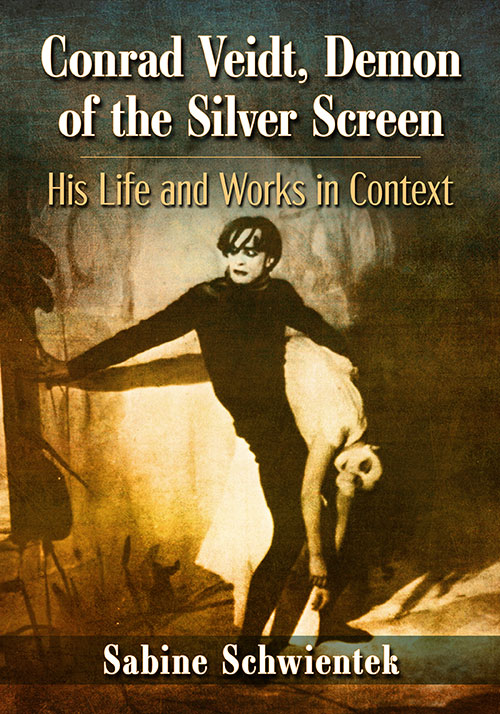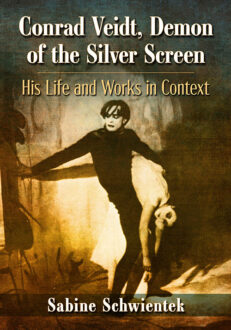Conrad Veidt, Demon of the Silver Screen
His Life and Works in Context
$49.95
In stock
About the Book
This book depicts the life of Conrad Veidt (1893–1943), the defining German actor of Expressionist cinema in the 1920s. His legendary performance in Das Cabinet des Dr. Caligari (1919/20) earned him the epithet “Demon of the Screen” and made Veidt an international star. To this day, Veidt is considered an icon of early horror film. He showed his acting range in more than a hundred films, among them masterpieces such as The Indian Tomb (1921), Orlac’s Hands (1924), The Man Who Laughs (1928), The Thief of Bagdad (1940), and Casablanca (1942).
Conrad Veidt used his acting career to become socially and politically involved, starting with the film Anders als die Anderen, the first film to advocate homosexual rights, in 1919. After the Nazis came to power, he left Germany to protest anti–Semitism and Nazi rule. Along with his biography, this book provides insights into the development of filmmaking from its beginnings through the 1940s, an epoch of cinematic art marked by technical innovations like sound and color film and by world-shaking events, including two world wars.
About the Author(s)
Bibliographic Details
Sabine Schwientek
Format: softcover (7 x 10)
Pages: 244
Bibliographic Info: 29 photos, notes, bibliography, index
Copyright Date: 2023
pISBN: 978-1-4766-9081-0
eISBN: 978-1-4766-4917-7
Imprint: McFarland
Table of Contents
Acknowledgments vi
Preface 1
Introduction 3
1. Reflections 7
2. World Premiere 9
3. The Olympus 17
4. “My master is waiting for you!” 21
5. Stage and Film 29
6. “Let there be light!” 35
7. Different from the Others 46
8. “You must become Caligari!” 52
9. Demon of the Silver Screen 61
10. Danse Macabre 69
11. Veidt’s Many Faces 79
12. Conrad “Fight” 87
13. The Man Who Laughs 94
14. Sound or Silence 101
15. Journey into the Night 113
16. The Other Side 118
17. Between Fear and Freedom 126
18. Jew Süss 132
19. A New Home and Old Friends 137
20. Cheerful to Cloudy 143
21. Under a Foreign Flag 148
22. Over the Rainbow 159
23. Cinema of War 167
24. As Time Goes By 181
25. The Final Curtain 188
26. The Conrad Veidt Society 191
Filmography 193
Chapter Notes 209
Bibliography 227
Index 231
Book Reviews & Awards
• “Splendid… Here, in the English translation of Dämon der Leinwand, Dr. Schwientek guides those many legions of Veidt’s fans and followers not fließend Deutsch (fluent in German) through the actor’s tragically brief life, his fascinating career, and the development of the cinema into a fascinating art form.”—John T. Soister, author of Conrad Veidt on Screen
• “Conrad Veidt studies benefit tremendously from Sabine Schwientek’s wonderful book on the film actor whose work included everything from The Cabinet of Dr. Caligari (1920) to Casablanca (1943). Highly recommended.”—Gary D. Rhodes, Ph.D., author of The Birth of the American Horror Film
• “I first liked Conrad Veidt the actor. When I was growing up, most of his English-language films were shown regularly on TV…But when I learned of his humanitarian efforts before and during WWII, I became a fan of Conrad Veidt the man. Conrad Veidt deserves to be remembered for both reasons, his great acting and his great humanitarian activism, and Sabine’s book captures both the actor and the man wonderfully.”—Barbara Peterson, president, Conrad Veidt Society
• “Conrad Veidt was one of the great actors of the German screen and a courageous man as well so it’s shocking so little has been written about him. Sabine Schwientek here does much to correct this injustice with a very detailed biography of Veidt and a close examination of his work in film and on stage. Though his German period gets a heavy emphasis, his time in England and later the United States is also covered thoroughly. Fans of horror are apt to emphasize Veidt’s appearance in Caligari while lovers of vintage film remember him mainly for his Nazi major in Casablanca but Schwientek outlines in her book how much more there was to his extraordinary career.”—Henry Nicolella, author of Frank Wisbar, the Director of Ferryman Maria, from Germany to America and Back
• “A comprehensive account of a giant of German cinema in the 1920s and 30s who resisted the rise of Nazism and in 1935 was forced into exile in Britain and the United States where he continued to struggle against racism, antisemitism, and homophobia. … Conrad Veidt’s sympathy for the marginalized homosexual and his pioneering resistance to the rising tide of antisemitism in Jew Süß, a sympathetic portrayal of a Jewish victim of persecution, provide Schwientek with an opportunity to describe and define the social and political currents that shaped Veidt’s career. In our day, a time of global environmental, social, and political crisis, a German voice of resistance to Nazi racism and authoritarianism is extremely relevant. Speaking uncomfortable truth to your own people on behalf of the marginalized, despised, and persecuted is the essence of a true nobility that resides not in blood but in courage and compassion.”—Charles McCollester, past president of the Pennsylvania Labor History Society and the Battle of Homestead Foundation





